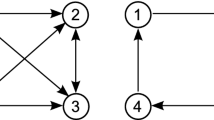Abstract
Rational play of Noncooperative Games is investigated under the assumptions that a particular form of Best Reply Principle holds, each player has at least one rational strategy and all strategies are either rational or irrational. These assumptions are shown to imply that (a) some weakly dominated strategies are rational (b) recursive reasoning can be misleading (c) only a Strict Nash Equilibrium can be a solution. A Supplementary Best Reply Principle is formulated. It sheds further light on which games have solutions and on rational play in games without them. The relationship between these results and those of other authors is discussed.
Similar content being viewed by others
References
Abreu, D. and Pearce, D. G.: 1984, ‘On the Inconsistency of Certain Axioms on Solution Concepts for Noncooperative Games,’ Journal of Economic Theory 34, pp. 169–74.
Bacharach, M. O. L.: 1985, unpublished note, Christ Church, Oxford.
Bacharach, M. O. L.: 1987, ‘A Theory of Rational Decision in Games’, Erkenntnis 27, pp. 17–55.
Bernheim, R. D.: 1986, ‘Axiomatic Characterisations of Rational Choice in Strategic Environments’, Scandinavian Journal of Economics 88, pp. 473–488.
Binmore, K.: 1986, ‘Modelling Rational Players’, Suntory Toyota International Centre for Economics and Related Disciplines Discussion Paper 86/133. London School of Economics and Political Science.
Bonanno, G.: 1987, ‘The Logic of Rational Play in Extensive Games’, Mimeo, University of California, Davis.
Blume, L. E.: 1987, ‘Lexicographic Refinements of Nash Equilibrium’, Mimeo, University of Michigan.
Brandenburger, A. and Dekel, E.: 1986, ‘On an Axiomatic Approach to Refinements of Nash Equilibrium’, University of Cambridge Economic Theory Discussion Paper no. 104.
Cubitt, R. P.: 1986, ‘Some Unfamiliar Properties of the Best Reply Principle’, Mimeo, The Queen's College, Oxford.
Dixit, A.: 1982, ‘Recent Developments in Oligopoly Theory’, American Economic Review Papers and Proceedings, pp. 12–17.
Fudenberg, D., Kreps, D. M., and Levine, D. K.: 1986, ‘On the Robustness of Equilibrium Refinements’, I.M.S.S.S. Technical Report no. 489, Stanford University.
Kohlberg, E. and Mertens, J.-F.: 1986, ‘On the Strategic Stability of Equilibria’, Econometrica 54, pp. 1003–37.
Kreps, D. M. and Wilson, R.: 1982, ‘Sequential Equilibria’, Econometrica 50, pp. 863–94.
Myerson, R.: 1978, ‘Refinements of the Nash Equilibrium Concept’, International Journal of Game Theory 7, pp. 73–80.
Selten, R.: 1975, ‘Re-examination of the Perfectness Concept of Equilibrium Points in Extensive Games’, International Journal of Game Theory 4, pp. 25–55.
Van Damme, E.: 1983, Refinements of the Nash Equilibrium Concept, Springer-Verlag, Berlin-Heidelberg.
Author information
Authors and Affiliations
Rights and permissions
About this article
Cite this article
Cubitt, R. Refinements of Nash Equilibrium: A critique. Theor Decis 26, 107–131 (1989). https://doi.org/10.1007/BF00159222
Issue Date:
DOI: https://doi.org/10.1007/BF00159222




